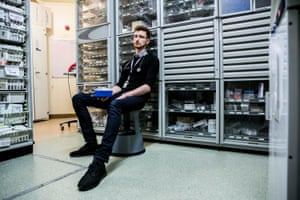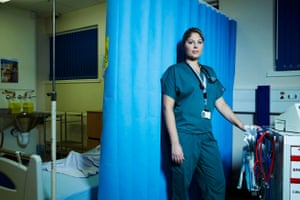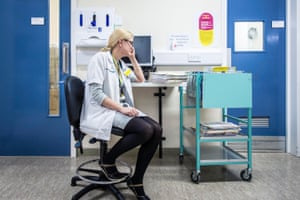From as young as 23, junior doctors work in every department of a hospital, from the corridors of A&E to the operating theatres. A new Channel 4 series, Confessions of a Junior Doctor, explores the story of these NHS frontliners as they deal with unprecedented difficulties for public healthcare. Four of them, writing anonymously, describe these early years.
The junior paediatrician
“Doctor! There’s seven in the waiting room, a child upstairs has pulled his cannula out and A&E say you’ve got 20 minutes left to see that child with a burn,” the nurse in charge barks furiously. I’m interrupted by a screeching bleep. “Better answer that,” I say, with a thinly veiled whimper. “Doctor, we’ve got a 75-year-old epistaxis here, on warfarin. I can’t get it to stop, come now!” In plain English, that’s an elderly man who is about to die from an unstoppable nosebleed.
I sprint via children’s A&E to launch a rapid charm offensive and manage to buy time to see the burnt child later. Carnage meanwhile ensues as a hapless elderly gentleman is spraying blood from his nose and mouth. After 45 minutes of tinkering with various sprays, gauze and nasal packs, I manage to stop his bleeding. A nasal pack, by the way, is a tampon with a rough outer surface like a nail file. Imagine that being rammed into your nose at midnight; a necessary evil, I assure you. I bid a curtailed farewell and sprint back to paediatric A&E.

There, my heart sinks as three-year-old Oscar weeps in pain. He was victim to curiosity and managed to tip a hot coffee on himself. He breaks the ice by laughing and grabbing my head torch – apparently I’m a cartoon Minion! I give pain relief and fight to dress his wounds, and book him into a specialist clinic for tomorrow morning. We high-five and I send him home. A moment of light relief in an otherwise dreadful night.
I work for the next six hours to clear my waiting room of patients with their relatively minor ailments, sent from the out-of-hours GP. It’s 4am and I’m still getting an onslaught of referrals from all directions. The entire night I am needed in three places at once, firefighting as I go along. I’m not happy, the team isn’t happy and, most crucially, my patients aren’t happy. I’m despondent – we need increased staffing and a fresh change in attitude. It seems as though the current system is optimised for patient flow rather than patient care. As for the elderly chap with the nosebleed, thank God he arrived when my other patients were less urgent, and I got to him when I did.
The paediatric registrar
When asked why you want to do medicine, the stock medical student answer is often: “To help others.” While this is undoubtedly a rewarding bonus, a more realistic question for doctors in the current climate, all of whom have lives and families of their own, is rather: what are you prepared to sacrifice to succeed in medicine?
I’m a paediatric registrar. For me, nothing compares to the unique challenges of managing the care of children and their families. Having an unwell child is a frightening experience for parents and clinicians alike. Treating them, and seeing the majority do very well, is an incredibly rewarding privilege.
As a (now not so) new registrar, “the fear” briefly returned to me as I stepped up to this new level of seniority. My first out-of-hours shift as a new registrar came with an overwhelming sense of awareness that I was responsible for providing the emergency care and leading the junior team.
While I am a doctor to countless little boys and girls, I am also a mum to my own little boy. Settling into my role has therefore been a mixed journey. The shift-based, unpredictable nature of clinical work has made childcare a difficult balancing act – particularly with a surgeon husband whose hours can be as unreliable as mine. I remember seeing my son’s first scan and searching for abnormalities – the downside of knowing what can go wrong. I tucked him into bed before my first registrar night shift, hoping “mummy’s at work tonight” wouldn’t become one of his first phrases. The families I meet on those shifts remind me how precious he is, and he in turn helps me understand the angst that those parents must be experiencing. My son has undoubtedly made me a better doctor, a more insightful version of myself.

Who else gets to calm frightened patients by singing Twinkle, Twinkle Little Star, or gain their trust for a procedure through an encyclopaedic knowledge of Peppa Pig? Despite being around them at home and work 24/7, children are always full of surprises, and that is what keeps me motivated.
The junior doctor on the A&E ward
On-call shifts are usually going to be busy. I knew one night would be hectic when I arrived and there were 26 patients waiting to be seen. The medical team consisted of one other house officer and a registrar, and we were responsible for clerking new admissions, covering two assessment wards and carrying the cardiac arrest bleeps.
That night was particularly tough. It was during winter when the emergency care crisis was at its peak, and the hospital was full. With no beds on the wards, the patients stacked up in A&E and just kept coming. Not only was the volume of patients high, but many were very unwell with complex problems.
When work is that busy you tell yourself: “I can only do what I can do; I need to prioritise and go from there.” With experience, you learn to force yourself to grab something to eat and drink while doing paperwork, as there is no point waiting for a break that never comes. Without sustenance, a 13-hour shift becomes impossible. Sometimes, a kind nurse will make you a cup of tea.
Things get really stressful when several patients simultaneously become acutely unwell and prioritising is almost impossible. I once had five patients all deteriorating – fortunately, they were on the same ward, which helped logistically, but added to the danger that they would “merge into one” and mistakes could be made.
After a day or night like that, I often drive home going through my patient list worrying that I have forgotten something. Yet no matter how tough work has been, I always leave knowing that I have made a difference to patients and their families. That helps me get through the more challenging shifts, when it feels as though there is just not enough time.

The junior doctor on the surgical ward
7.45am: One of the nursing staff tells me the hospital is on “black alert”; there are no beds available anywhere in the hospital. I already know it’s going to be a long day.
The on-call consultant has been up all night in an emergency operation, so ward round is delayed, which has a knock-on effect throughout the day. I get a call at 1pm from the bereavement office to complete a death certificate for a woman who passed away in the night.
My bleep goes. A young patient has become inexplicably confused. I assess and treat him to the best of my ability, but he needs a senior review; I feel helpless. It’s 2pm and I haven’t made it to the bereavement office – they have bleeped again. A nurse tells me a patient can return to her nursing home but transport has been arranged for 3pm. There is a hectic dash to complete all of the paperwork and order the necessary medicines.
It’s now past 3pm and I haven’t yet eaten, but as I collect my lunch, a consultant arrives to review his patients. This generates more jobs, including an urgent investigation for a patient heading to theatre first thing tomorrow morning. It takes more than an hour to request the investigation and find a technician able to perform it, but they are short staffed and cannot guarantee it will happen before the end of play today. My registrar calls; he has organised a scan for the young gentleman with confusion, to rule out stroke, and asks me to chase the results.
It’s gone 4.30pm and I still haven’t eaten. I need to chase test results, so sit in the doctor’s office and plan to eat while I work. However, one of the results shows a patient needs a blood transfusion. He requires a further blood test, so I take the sample and deliver it to the laboratory on the other side of the hospital. I go back to checking results. The report for the confused man identifies a stroke. I contact my registrar and organise an urgent review by the stroke team.
I look at the clock – it has gone 6pm. I should have finished at 5pm. Then I remember the death certificate. Too late. I am tired and hungry, and know I face it all again tomorrow.
• Confessions of a Junior Doctor is on Channel 4 at 9pm
Nasal tampons, black alerts and Peppa Pig: junior doctors confess all
Hiç yorum yok:
Yorum Gönder